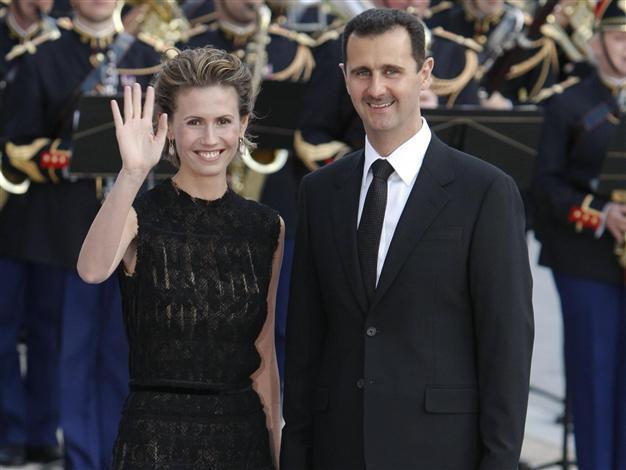EU imposes sanctions on Assad's wife, relatives
BRUSSELS - The Associated Press

Syria's President Bashar Al-Assad and wife Asma arrive at a dinner during a EU-Mediterranean summit in this file photo taken in Paris July 13, 2008. REUTERS Photo
EU foreign ministers imposed sanctions today on Asma Assad, the stylish, British-born wife of the Syrian president, banning her from traveling to European Union countries and freezing any assets she may have there.The foreign ministers also imposed the same sanctions on President Bashar Assad's mother, sister and sister-in-law, and eight government ministers, in a continuing attempt to stop the bloody crackdown on opposition in the country.
In addition, the assets of two Syrian companies have been frozen, an EU official said. Bashar Assad himself has been the subject of EU sanctions since May.
Three officials spoke to the Associated Press on condition of anonymity to discuss a decision that will be announced later Friday following the foreign ministers' meeting in Brussels.
Also Friday, the United Nations' top human rights body sharply condemned the crackdown and the U.N. announced that the joint U.N.-Arab League envoy, Kofi Annan, would travel to Russia and China for more talks aimed at peacefully resolving the crisis.
The U.N. estimates that more than 8,000 people have been killed since an uprising began in Syria a year ago.
The EU has imposed 12 previous rounds of sanctions against the Syrian regime, yet the crackdown has only intensified. But French Foreign Ministry spokesman Bernard Valero said he believed what he described as the three pillars of the regime were getting weaker.
"The army is crumbling. The second pillar, the economy, is unstable. The third is terror," Valero said.
Asma Assad, 36, was born in London, spent much of her life there, and has British citizenship. She has been seen as the softer face of the ruling family an attractive and refined woman dubbed "chic" by France's Elle magazine and "sexy" by The Sun, Britain's top-selling tabloid.
A month before the start of the Syrian regime's brutal repression, Vogue magazine praised her for her charity work, calling her "Rose of the Desert." Asma Assad, who is of Syrian heritage, moved to the country in 2000 to marry the president, who had previously been an ophthalmologist in Britain.
Britain's Home Office said Friday that a British citizen subject to a EU travel ban could not be refused entry into the country.
However, Nigel Kushner, a British lawyer who is an expert on sanctions, said he believed Asma Assad is now effectively banned from traveling to the UK.
"No EU national and no EU company can make any funds or any economic resources available to Asma al-Assad, nor can anyone receive funds or economic resources from her," Kushner said. "And that means that, essentially, she won't be able to go on any shopping trips in the EU or via third parties." "To the extent she has any bank accounts in the EU, her assets will be frozen," Kushner said a sanction that would prevent her from selling property, receiving rent, or anything similar.
Annan and two aides will go to Moscow and Beijing to press the case for his six-point plan, his spokesman, Ahmad Fawzi, said. Western countries have pushed for U.N. Security Council action, but Russia and China have twice vetoed resolutions criticizing Assad's regime.
"Negotiations are at a very delicate stage. He's not going to mediate through the media," Fawzi said. "The crisis on the ground is severe. We have to make progress on the ground soon. Every minute counts." Fawzi told reporters Friday that Annan's team is "currently studying the Syrian responses carefully and negotiations with Damascus continue." On Wednesday, the U.N.'s Security Council issued a nonbinding statement calling for a cease-fire and endorsing Annan's plan, which includes continued talks and a daily two-hour halt in the fighting to provide aid.
British Foreign Secretary William Hague, speaking in Brussels, where the EU foreign ministers are meeting, said Friday it was very important to increase pressure on the Syrian regime.
"Their behavior continues to be murdering and totally unacceptable in the eyes of the world," he said on his way into the meeting.
In Geneva, on Friday, the 47-member U.N. Human Rights Council voted 41 to three in favor of an EU-sponsored resolution that was backed by Arab nations and the United States. China, Russia and Cuba voted against. Two countries abstained and one didn't vote.
The resolution condemned "widespread, systematic and gross violations of human rights and fundamental freedoms perpetrated by the Syrian authorities" including summary executions, torture and sexual abuse of detainees and children, and other abuses.
It also condemned "the deliberate destruction of hospitals and clinics, the obstruction and denial of medical assistance to the injured and sick, and the raids and killing of wounded protesters in both public and private hospitals." The vote also extended the mandate of a U.N. expert panel charged with reporting on alleged abuses in the country.
U.S. Ambassador Eileen Chamberlain Donahoe called the Geneva-based council's action an important development.
"For the first time, the council has asked its team of investigators to provide continuous mapping of both human rights violations and casualties," she said. "The council has also asked the Office of the U.N. High Commissioner for Human Rights to ensure the safe and secure storage of all evidence of human rights violations gathered. ... This is the first time such a request has been included in a Human Rights Council resolution." Syria's ambassador Fayssal al-Hamwi rejected Friday's vote as "biased." "It does not reflect the reality on the ground, on the contrary," he told the meeting.
The council's decisions aren't legally binding, but they are seen as an important indicator of the international community's stance on human rights issues.
















